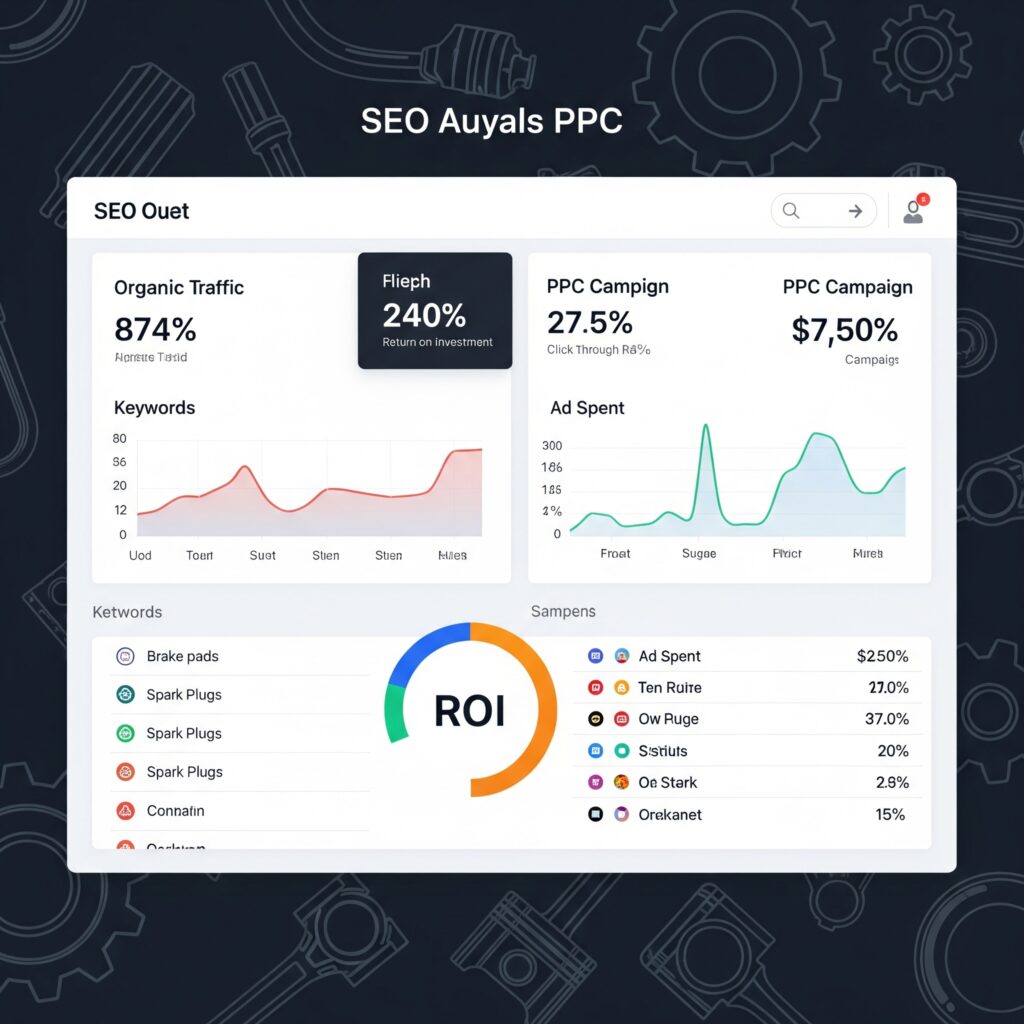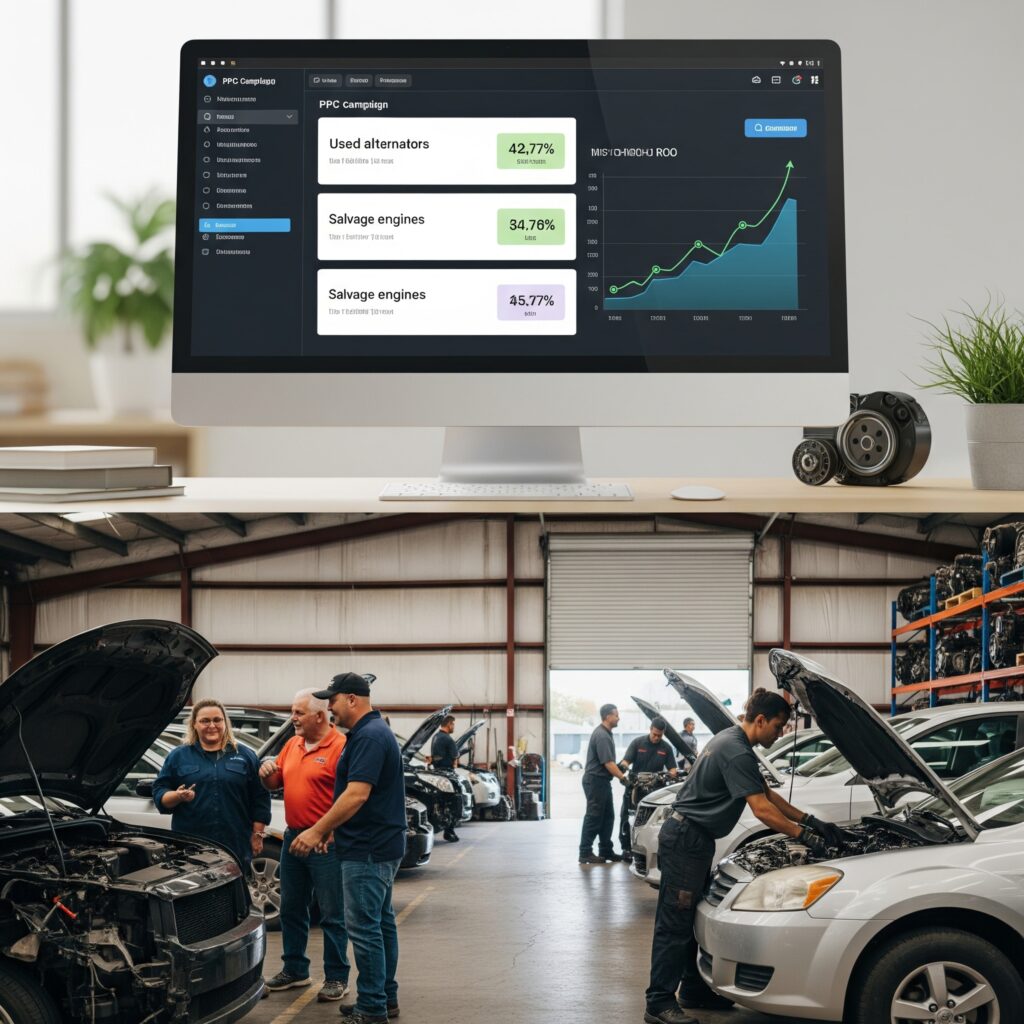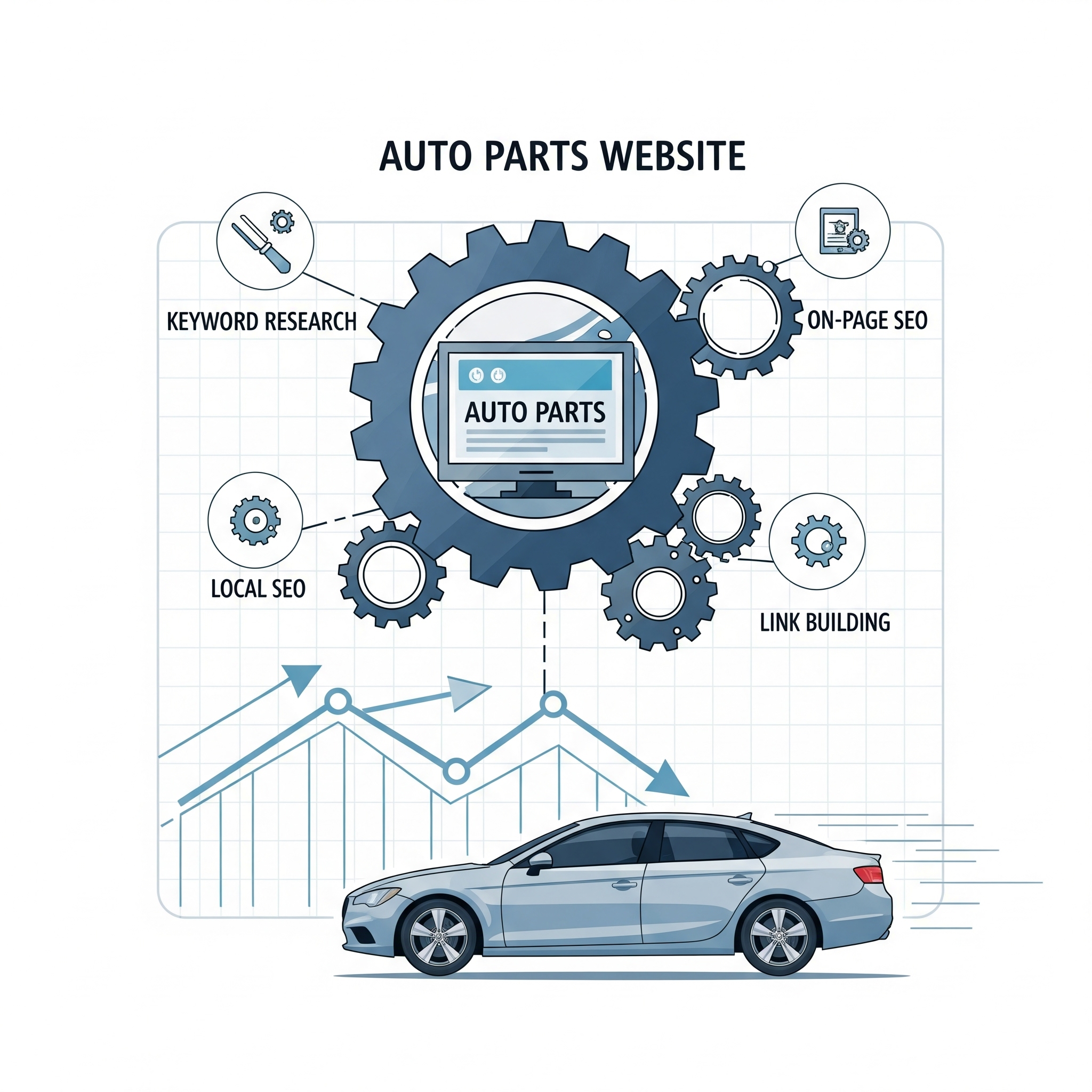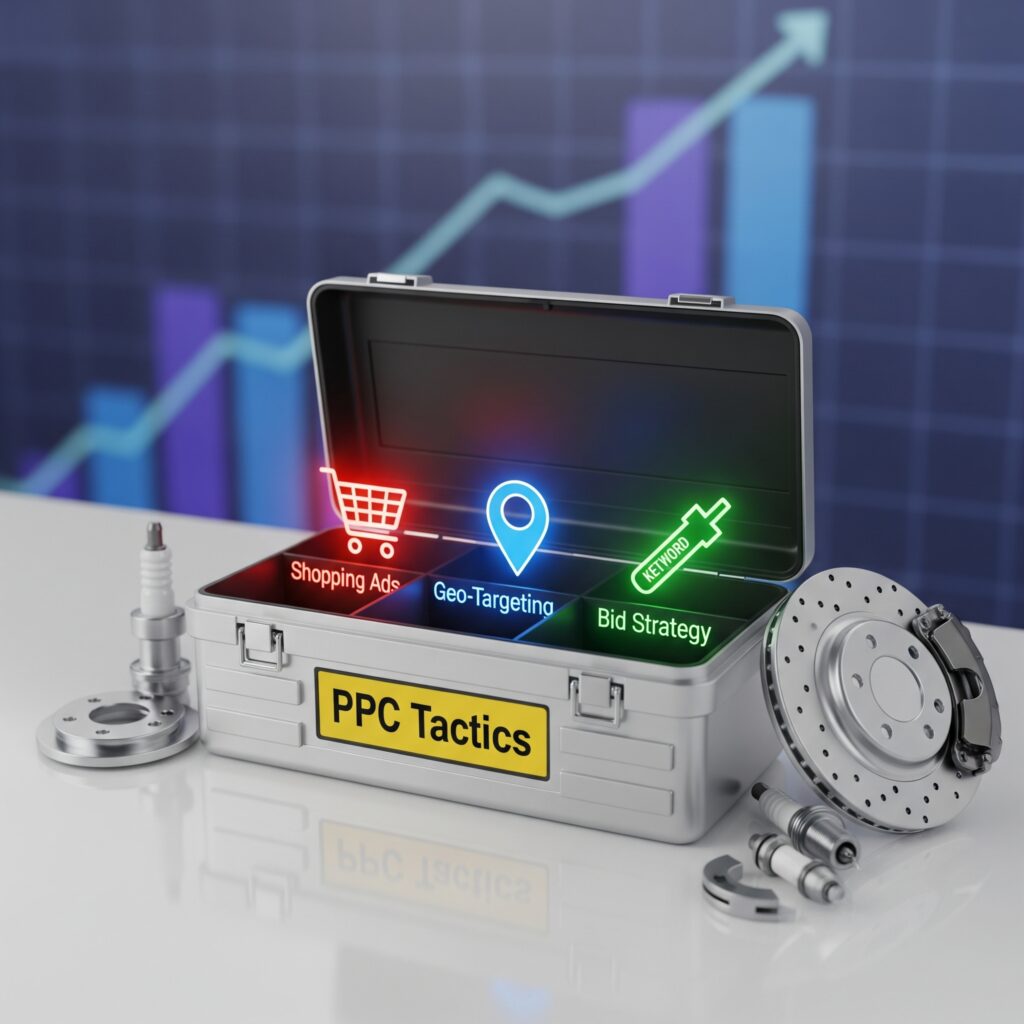In today's competitive market, the auto parts retail sector faces the challenge of distinguishing itself online. Companies in this space are continually seeking digital solutions that enhance visibility and drive sales effectively. One of the most powerful combinations in digital marketing is the synergy between Search Engine Optimization (SEO) and Pay-Per-Click (PPC) advertising, both crucial for achieving high returns on investment.

SEO focuses on boosting organic search rankings through strategic content creation and technical enhancements, while PPC provides a direct path to the top of search results via paid advertising. Each approach boasts distinct advantages; SEO offers long-term sustainability and authority, while PPC delivers immediate results and precise targeting. For auto parts retailers, understanding and leveraging these differences is essential to optimizing their online presence and maximizing revenue.
This article explores the synergy between SEO and PPC in the context of auto parts retail, offering insights into effective strategies and tactics. From keyword research and technical considerations to effective bidding and ad formats, we'll examine how these methodologies can be harmonized. Additionally, we’re pleased to present case studies, expert opinions, and emerging trends to equip auto parts retailers with the knowledge they need to enhance their sales strategies confidently.
The Relationship Between SEO and Auto Parts Retail PPC
In the dynamic world of auto parts retail, balancing Search Engine Optimization (SEO) and Pay-Per-Click (PPC) marketing is crucial for maximizing both short-term and long-term business success. SEO provides the groundwork for organic growth over time by enhancing visibility in search engine results, but its impact is often gradual. Conversely, PPC allows auto parts retailers to engage potential customers immediately, focusing on exact search terms and demographic details to ensure ad relevance and optimize conversion rates. This relationship between SEO and PPC highlights the importance of integrating both strategies, allowing businesses to seize immediate opportunities while building a robust digital presence for the future.

Understanding PPC and its Role in Auto Parts Retail
PPC marketing stands as an essential component for any auto parts retailer looking to thrive in the digital marketplace. Through PPC, businesses can create targeted ads using popular keywords that their potential customers frequently search. This strategy is especially pivotal in the competitive automotive aftermarket, where timely and seasonal promotions can drive substantial interest.
For instance, campaigns can be enhanced by targeting specific branded keywords, increasing the likelihood of capturing search interest in business names and associated products. Investment in PPC, which typically ranges from $9,000 to $10,000 per month, offers a flexible budgeting framework that allows businesses to adjust their spending according to goals and market conditions. By focusing on these key elements, auto parts retailers can enhance online visibility and successfully appeal to customers seeking replacement parts, upgrades, or specialty items.
The Distinctive Benefits of SEO for Auto Parts Retail
In the auto parts industry, a strong SEO foundation is a strategic advantage that can significantly boost a business's online presence. SEO enables retailers to reach customers at pivotal moments, precisely when they're searching for specific parts and services. This timely visibility can effectively intercept potential customers, increasing the prospects of lead conversion. Although the auto parts market is highly competitive with the presence of giants like Amazon and eBay, smaller retailers can still excel by implementing robust SEO strategies.
Effective SEO requires managing and optimizing an extensive range of product pages to improve search engine rankings systematically. While this is challenging, it is an essential step for enhancing business competitiveness. Eventually, with sustained SEO efforts, auto parts retailers can achieve enhanced visibility and stronger market positioning, allowing them to stand out in a saturated industry.
SEO Strategies for Auto Parts Retail
Navigating the digital landscape is critical for auto parts retailers looking to reach potential customers effectively. With high competition from large marketplaces like Amazon and eBay, smaller to mid-sized businesses must employ effective SEO and search engine marketing strategies. These strategies are integral in ensuring that when customers are searching for specific auto parts, these businesses can appear prominently in search engine results. By elevating website rankings, auto parts companies can draw more qualified leads, converting them into sales.
A core component of a successful SEO strategy is precise keyword targeting, which can capture the relevant traffic needed to intercept searches related to auto parts. Given the challenge of managing extensive product catalogs, unique and optimized product descriptions are vital for improving SEO performance and standing out in a crowded market.

Keyword Research for Auto Parts
Effective keyword research is foundational for creating a successful PPC marketing strategy in the auto parts industry. This involves categorizing keywords into several distinct groups: part-specific terms, symptom-related searches, brand-specific queries, universal part terms, and DIY-related terms. Each category is essential in crafting a comprehensive strategy that anticipates various ways potential customers might search for auto parts.
Understanding how an auto parts inventory management system organizes products is equally crucial, as this knowledge allows better alignment of Google Ads account structures with product offerings, enhancing overall management efficiency. Tools such as SEMrush provide valuable insights into competitors' strategies, allowing businesses to view their competitors' keywords and ad tactics and identify opportunities to refine their PPC approaches. Incorporating negative keywords is paramount, preventing ads from displaying for irrelevant searches and focusing resources on high-intent keywords. Emphasizing long-tail keywords, which often include specific car models or years, can offer a strategic advantage by capturing high-intent traffic at a lower cost per click.
Creating and Optimizing Content for Auto Parts
Crafting and fine-tuning content is a vital part of PPC marketing for auto parts retailers. Precise keyword targeting, including phrases like "auto parts store near me" or "buy car parts online," significantly enhances visibility for consumers searching for auto parts. Additionally, compelling ad copy and well-optimized landing pages tailored to the auto parts sector can effectively draw potential customers. Highlighting product descriptions, promotions, and special offers in these spaces can entice and convert potential buyers.
Moreover, providing compatibility information that is instantly scannable on landing pages aids shoppers in quickly determining product fitment, thereby increasing conversion rates. Strategic A/B testing of landing pages ensures they effectively convert visitors after ad clicks by identifying which elements resonate most with the target audience. Comprehensive keyword research, therefore, should encompass part-specific, symptom-based, and brand-specific terms, alongside universal and DIY-related searches, to navigate the complex automotive search landscape effectively.
Technical SEO Considerations

Technical SEO forms the backbone of improving visibility for businesses operating within the auto parts market. This specialized SEO area is essential for intercepting searches related specifically to auto parts and accessories, which can significantly boost qualified leads and sales. One of the major challenges in the automotive aftermarket parts industry is the intense competition posed by large online marketplaces like Amazon and eBay, making achieving top search engine rankings difficult.
Moreover, managing an extensive product catalog, often with thousands of SKUs, requires each product to have a unique and optimized headline and description to maximize SEO effectiveness. By enhancing visibility and search rankings, smaller automotive parts businesses can position themselves as reliable alternatives against industry giants, thereby strengthening their market presence. It's not just about holding a spot in search results but ensuring that consumers searching for auto parts, from small items like spark plugs to larger specialty accessories, can find and choose their products confidently.
PPC Tactics for Auto Parts Retail

In the competitive landscape of auto parts retail, leveraging Pay-Per-Click (PPC) marketing is crucial for gaining visibility among customers actively searching for parts online. Auto parts PPC campaigns are particularly effective in targeting consumers seeking reliable components for their vehicles. With the right PPC strategies, retailers can capture potential customers who are further down the purchasing funnel, ready to make buying decisions.
One of the effective tactics is branded keyword targeting, which helps auto parts retailers maintain dominance in search results directly associated with their business name, thereby minimizing the risk of competitors overshadowing their brand. Moreover, careful investment in PPC campaigns is essential; starting with a modest budget focused on learning and optimization can pave the way for sustainable scaling and greater ROI in the long run. Additionally, shopping PPC campaigns can significantly benefit auto parts businesses by attracting highly targeted and relevant audiences through the use of visual listings, addressing challenges like rising CPCs (cost-per-click) and conversion difficulties.
Effective Bidding Strategies
Effective bidding strategies are pivotal to maximizing returns from auto parts PPC campaigns. Businesses must use industry cost benchmarks to inform their budget allocation and establish realistic performance expectations. Given the average CPC for auto repair and replacement parts keywords is around $3.39, auto parts retailers can categorize their products by type, price, and margin within Google Shopping campaigns, aiding efficient targeting.
Employing vehicle fitment-specific campaigns can also be instrumental in matching search terms to search intent, ensuring that potential customers find the most relevant products and information. Avoiding generic automotive PPC campaigns is crucial as they generally result in lower ROI due to their broad focus and reduced engagement. Instead, focusing on specific product categories and customer interests leads to better targeting and conversion rates.
Selecting Optimal Ad Formats
Choosing the right PPC ad formats is fundamental for the success of automotive PPC campaigns. Understanding the behavior of the target audience is key to selecting an ad format that aligns with both campaign goals and audience preferences. Automotive businesses can tailor their PPC search, local service, or video ads according to the specific search behaviors and geographic location preferences of their target audience. By incorporating relevant keywords throughout the advertising process, businesses ensure their visibility on search engines, thereby converting potential leads into satisfied customers. Platforms like Google Ads and Microsoft Advertising offer diverse ad formats, such as text and shopping ads, to reach various audience demographics effectively. These formats are particularly prevalent due to their capacity to resonate with users actively searching for specific auto parts, simplifying their journey from search to purchase.
Leveraging Geographical Targeting
Geographical targeting, or geotargeting, proves to be a transformative strategy in automotive PPC campaigns by allowing ads to target specific locations such as cities or neighborhoods. This localization enhances ad relevance, thereby boosting local search performance and conversion rates. Auto parts businesses can utilize geotargeting to connect with new customers efficiently, especially when seeking to expand into multiple regions or new markets.
By customizing ad messages to reflect regional vehicle preferences, seasonal conditions, and local trends, rather than merely focusing on geographical location, automotive companies can increase their appeal and relevance to local audiences. Furthermore, integrating PPC campaigns with a Google Business Profile helps drive a significant increase in in-store visits, as these profiles provide clear service availability, enhancing the business's relevance for nearby shoppers. Additionally, geo-targeted ads can reduce shopping cart abandonment rates by spotlighting locally relevant products, thereby maximizing the likelihood of purchase.
Achieving Balance: Integrating SEO and PPC
In the fast-paced auto parts industry, achieving a balance between SEO and PPC is crucial for maximizing digital marketing success. PPC advertising offers immediate visibility, positioning automotive businesses directly in front of potential customers. This instant impact complements SEO, which takes time but provides long-term benefits by building brand authority and improving organic reach. By combining these strategies, auto parts retailers can cover all potential customer touchpoints, ensuring a comprehensive approach. This integration not only maximizes online reach but also provides valuable data from PPC campaigns that can refine and enhance SEO efforts. Leveraging the strengths of both PPC's instantaneous results and SEO's lasting impact is essential for sustained eCommerce growth in this competitive market.
Seasonal and Promotional Strategies
Seasonal and promotional strategies are vital for auto parts businesses looking to optimize their PPC marketing efforts. By keeping a close eye on industry trends, businesses can align their PPC strategies with seasonal changes and promotional opportunities, such as holiday sales or the launch of new vehicle models. Utilizing a customer database effectively can help promote special offers at the right times, enhancing reach through paid media campaigns.
Automating email and SMS programs can also play a critical role, maintaining customer engagement by delivering timely offers that drive repeat purchases. Analyzing campaign data provides insights that can identify trends and fine-tune strategies for better promotional success. This approach allows automotive companies to seize opportunities as they arise, ensuring that they stay relevant and competitive throughout the year.
Case Studies: Successful Integration Examples
Examining case studies of successful SEO and PPC integration in the auto parts industry provides valuable insights into effective digital marketing strategies. Hedges & Company conducted notable PPC case studies showing increased site traffic and sales when PPC campaigns were synchronized with organic efforts. These studies underscore the benefits of integrating immediate audience engagement from PPC with the sustainable growth potential of SEO in the competitive automotive sector.
Similarly, Automotive SEO case studies featured on IR's website highlight the dynamics between multimedia search strategies and how they collectively bolster an auto parts retailer's online presence. Drawing on data from a Google PPC case study further illustrates the profound impact of well-executed PPC strategies, emphasizing the importance of PPC advertising for capturing a share of the burgeoning online sales market. Such integrated approaches not only enhance reach but also deliver measurable business value in auto parts marketing campaigns.
Budget Management Tips
Effective budget management is critical to achieving success in automotive PPC marketing. Setting clear spending limits aligned with marketing goals can help ensure financial resources are used efficiently. It's essential to monitor spending closely to stay within budget constraints while ensuring PPC campaigns remain effective. Implementing rate adjustments based on performance data is crucial; increasing bids for high-performing keywords can optimize ROI, while decreasing bids for underperforming ones prevents unnecessary expenditure.
Industry cost benchmarks can guide realistic performance expectations, allowing for efficient budget allocation. Understanding the average cost-per-click for relevant keywords in the auto parts sector is important to avoid overbidding or underbidding, which can significantly impact campaign effectiveness. Proper budget management not only maximizes the impact of each dollar spent but also ensures sustained success in the fiercely competitive auto parts market.
Seasonal and Promotional Strategies
In the fast-paced auto parts industry, aligning PPC marketing strategies with seasonal trends and promotional opportunities is crucial. Monitoring industry trends can help auto parts retailers adjust their campaigns to capitalize on holiday sales or new model releases. By doing so, they can enhance their conversion rates and click-through rates effectively.
Utilizing seasonal specials is an excellent way to promote specific auto part purchases that fluctuate with the time of year. For instance, promoting winter tires as the colder months approach can drive significant online sales. Leveraging customer databases to highlight these offers at optimal times, and extending their reach through paid media, maximizes exposure among the target audience.
Automation of email and SMS programs plays a critical role in maintaining customer engagement. Special offers sent directly to customers not only promote repeat business but also keep automotive businesses at the forefront of consumers' minds.
Analyzing campaign data through tools like Google Analytics enables businesses to identify key trends and optimize strategies, ensuring they capitalize on every promotional opportunity. This targeted approach helps in defining PPC strategies and improving campaign performance across various search campaigns and shopping ads.
Case Studies: Successful Integration Examples
Recent case studies by Hedges & Company highlight the powerful synergy between PPC campaigns and organic search efforts in the automotive sector. These studies, along with insights featured on IR's website, emphasize how integrating these strategies can significantly boost site traffic and sales.
A pivotal Google PPC case study reveals the remarkable impact of PPC advertising in the auto parts industry, showcasing how it facilitates immediate audience reach and captures a substantial share of the burgeoning online sales market.
Here is a table outlining key findings from these case studies:
| Strategy | Impact |
|---|---|
| PPC + Organic Integration | Increased site traffic and sales |
| Google PPC Advertising | Immediate audience engagement and market share growth |
| Advanced PPC Strategies | Enhanced business value and measurable campaign success |
A few notable takeaways include:
- Improved Conversion Rates: Achieved through targeted Google Ads.
- Higher Click-Through Rates: Ensured by strategically relevant keywords.
- Effective Audience Targeting: Essential for automotive businesses to reach their ideal customers.
Together, these case studies underline the importance of advanced PPC strategies and performance tracking to drive measurable business outcomes in auto parts marketing.
Budget Management Tips
Effective budget management in automotive PPC requires strategic planning and careful monitoring. Here are some key tips:
- Set Spending Limits: Align your budget with your marketing goals to prevent overspending. Define clear spending limits for each campaign.
- Monitor Closely: Regularly track your spending to ensure you remain within your allocated budget while aiming for successful outcomes.
- Rate Adjustments: Optimize your ROI by increasing bids for high-performing keywords and reducing them for low-performers.
- Use Industry Benchmarks: Establish realistic expectations and efficient budget allocation by using industry cost benchmarks.
- Understand Average CPC: Knowledge of average cost-per-click helps avoid overbidding and underbidding, crucial in the competitive auto parts sector.
These strategies ensure efficient budget use, enhancing your PPC campaign performance.
| Budget Management Tips |
|---|
| Set spending limits |
| Monitor spending closely |
| Adjust bid rates effectively |
| Use industry cost benchmarks |
| Understand average cost-per-click |
By following these tips, automotive businesses can manage their PPC budgets effectively, ensuring their digital marketing efforts yield optimal results.
Tools and Techniques for Maximizing ROI
Maximizing the return on investment (ROI) in automotive PPC campaigns demands a blend of innovative tools and strategic techniques. Central to this process is the continuous refinement of keyword lists, informed by both performance data and prevailing market trends, which facilitates optimal ad targeting. Another pivotal approach is the regular updating and testing of landing pages to enhance user experience—ultimately increasing conversion rates and boosting ROI. Employing customer survey tools like Zigpoll provides insights into brand perception and customer satisfaction, critical factors influencing the overall effectiveness of PPC campaigns.
Analyzing assisted conversions throughout the buyer's journey illuminates the broader impact of your PPC efforts, empowering informed optimization decisions. Moreover, prioritizing ad budgets towards high-margin products and aligning them with brand identity ensures a more significant return. By implementing these strategies, automotive businesses can not only enhance their PPC outcomes but also strengthen their broader digital marketing initiatives.
Competitive Analysis Approaches
In competitive environments like the auto parts industry, a strategic approach to PPC is essential. Starting with a modest initial PPC investment allows automotive parts retailers to focus on learning and optimizing campaigns before scaling. A thorough understanding of competitor keywords can be instrumental in effectively targeting potential customers who are actively shopping for auto parts. Maintaining transparency in advertisements—particularly concerning prices, promotions, and terms of service—establishes credibility and compliance. The automotive sector faces rising costs per click (CPC) and conversion challenges, highlighting the need for refined and specialized PPC strategies. Continuous optimization of keywords and landing pages, grounded in performance data, is crucial for maintaining an edge in the fiercely competitive PPC landscape.
Tracking and Analyzing Metrics
To truly gauge the success of automotive PPC campaigns, tracking key metrics is imperative. Metrics like click-through rate (CTR), conversion rate, cost-per-click (CPC), and return on ad spend (ROAS) provide invaluable insights into campaign performance. Regular reports and performance insights reveal which aspects of the PPC efforts are thriving and which require adjustments.
CTR offers a snapshot of how effective the ad copy is in capturing attention and how accurately the target audience is being selected. Conversion rate, on the other hand, measures success in transforming clicks into desired actions, such as form submissions or purchase completions. ROAS stands out by providing a clear indicator of the financial returns from PPC activities, guiding smarter allocation of ad expenditure. Keeping a close watch on these metrics enables continuous refinement and boosts overall campaign effectiveness.
Enhancing Customer Lifetime Value
In the automotive sector, PPC advertising plays a vital role in enhancing customer lifetime value by enabling retailers to promptly engage and connect with potential customers, thereby fostering long-term brand loyalty. PPC aids in targeting branded keywords, allowing retailers to capture the attention of shoppers already considering competitors, effectively boosting customer retention. The detailed data gleaned from PPC campaigns offers crucial insights that help tailor customer interactions, driving improved long-term relationships.
By zeroing in on specific demographics and customer preferences through PPC strategies, retailers can craft more personalized marketing efforts, directly contributing to an increase in customer lifetime value. Moreover, effective PPC campaigns that meticulously track results and optimize targeting can continually evolve, refining customer engagement strategies to prolong customer lifetime value and maximize ROI.
Expert Recommendations and Future Trends
The auto parts industry is increasingly leaning on Pay-Per-Click (PPC) marketing to drive sales and improve visibility. Auto parts retailers are advised to start with a modest investment in PPC to facilitate learning and optimization, enabling them to make data-driven decisions. Partnering with established PPC service providers, such as WebFX, can enhance the effectiveness of these campaigns. These experts bring seasoned knowledge in strategically applying PPC strategies tailored specifically to auto parts businesses. Focusing on high-intent searches and precise keyword targeting allows retailers to gain a competitive edge by capturing audiences actively seeking specific components and services.
Insights from Industry Experts
In the fast-paced automotive sector, starting with a modest PPC investment for automotive parts retailers is crucial. This approach allows businesses to focus on learning and optimization. The goal is to achieve an ideal balance between spending and returns, as PPC can generate $2 in revenue for every dollar spent. This necessitates fine-tuning ad spend through specific campaign targeting, which can be achieved by setting strategic bids to maximize return on investment. Keyword research is paramount, enabling businesses to connect effectively with potential customers actively searching for auto parts. Shopping PPC campaigns offer an excellent opportunity for auto parts businesses to showcase their products through engaging visual representations, capturing a highly targeted market segment ready to make a purchase.
Projected Trends in SEO and PPC for Auto Parts
As the auto parts industry evolves, new trends in PPC advertising have emerged. Among these, video ads, particularly on platforms like YouTube, are gaining traction. This trend aligns with enhanced audience targeting powered by advanced data analytics. With an increasing number of consumers accessing content via smartphones, there is also a renewed focus on mobile-first advertising. Local search optimization remains a critical component of automotive PPC strategies, allowing businesses to effectively target nearby customers.
For auto parts eCommerce, PPC is integral, offering immediate audience reach, measurable results, and detailed user data for effective targeting. Unlike SEO, which requires time to manifest significant results, PPC advertising provides instant visibility. Automotive PPC campaigns strategically built around search intent and specific terms, such as vehicle fitment, leverage platforms like Google and Bing Shopping to enhance conversion rates, forming a powerful strategy in the digital marketing landscape.
about autorecyclingmarketers.com
Auto parts PPC marketing is an essential component of digital marketing strategies for the automotive industry. It involves using tools like Google Ads to reach a target audience effectively. Autorecyclingmarketers.com can help automotive businesses by leveraging PPC strategies to improve conversion rates and generate more online sales.
Successful PPC campaigns begin with identifying relevant keywords and employing audience targeting. Incorporating negative keywords is crucial to refining search campaigns and improving click-through rates. Google Analytics plays a significant role in monitoring campaign performance and measuring key metrics critical to an auto parts retailer's success.
To connect with potential customers, automotive companies can utilize various digital platforms, including social media, to enhance their visibility and reach their ideal customer base. Search Ads and Google Shopping are also valuable tools within the PPC arsenal for ensuring a robust online presence.
Additionally, autorecyclingmarketers.com supports the auto parts industry by advising on product categories and helping businesses optimize their shopping ads. An effective PPC strategy can significantly boost an auto parts business by aligning digital marketing efforts with the broader goals of increasing brand awareness and customer acquisition within the automotive sector.
Maximize your auto parts sales with autorecyclingmarketers.com
To maximize your auto parts sales, partnering with autorecyclingmarketers.com can be a game-changer. In the competitive auto parts industry, effective PPC management is crucial for attracting and converting potential customers. By leveraging platforms like Google Ads, auto parts retailers can experience significant monthly sales growth.
Data-driven PPC strategies employed by autorecyclingmarketers.com focus on real-time performance tracking, ensuring your digital marketing efforts deliver maximum value. High-intent shoppers are targeted using well-optimized product ads rich in detailed product and compatibility information, increasing the chances of conversion.
Consider the benefits of these PPC strategies:
- Enhanced visibility and improved ROI
- Capture high-intent shoppers
- Streamlined audience targeting
Autorecyclingmarketers.com offers expertise that helps auto parts businesses optimize their Google Shopping and Search Ads. By carefully selecting relevant and negative keywords, they improve click-through rates and conversion rates, aligning campaigns with the ideal customer base.
Here's a simple strategy outline:
| Strategy Element | Key Focus |
|---|---|
| Audience Targeting | Identify and engage high-intent auto parts shoppers |
| Keyword Optimization | Use relevant and negative keywords to refine reach |
| Real-Time Performance Tracking | Utilize Google Analytics for detailed insights |
Maximize your auto parts sales and connect with autorecyclingmarketers.com to stay ahead in the automotive sector.
FAQ
1. How can automotive parts retailers benefit from PPC?
PPC allows retailers to target consumers searching for replacement parts, performance upgrades, or specialty items, boosting both online and in-store sales.
2. What's a smart initial investment for newcomers in PPC?
New PPC users in the auto parts industry should begin with a smaller budget. This approach helps in learning and optimizing campaign effectiveness without significant financial risk.
3. What's the expected return on investment for PPC in this sector?
Typically, businesses earn $2 for every $1 spent on PPC advertising, showcasing its potential for high returns.
4. How important are keywords in PPC campaigns?
Utilizing keywords that reflect what potential customers search is essential. It ensures that ads reach consumers actively looking for auto parts.
5. What does strategic bid management entail?
Effective PPC campaigns require careful bid management to optimize returns, ensuring that ad spend leads to the highest possible revenue.
Tips for Success:
- Focus on relevant keywords
- Start with a manageable budget
- Monitor conversion rates and adjust strategies accordingly
By adhering to these guidelines, automotive parts retailers can enhance their PPC campaign performance.

